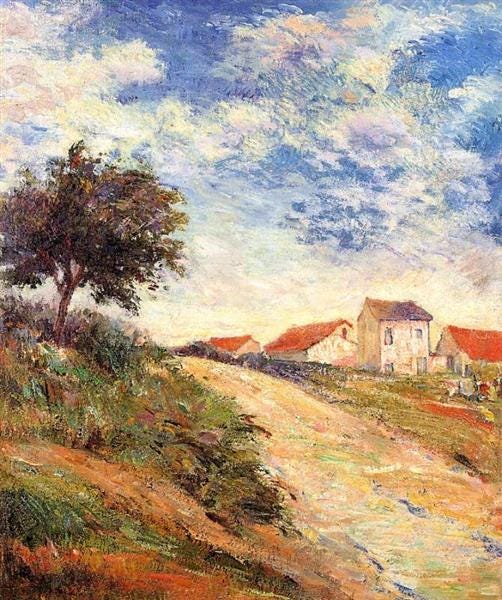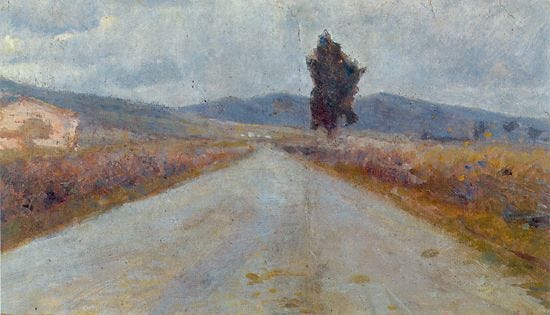An Applied Philosophy
But no one can live without a philosophy which points out the order, means and end of effort, intellectual or other…so we go about picking up a maxim here, a motto there, an idea elsewhere, and make a patchwork of the whole which we call our principles…” 1
Over the time that I’ve been home educating I’ve seen two extremes in how this way of education is put into practice. One of them is the ‘school at home’ approach where the classroom model is used in the home. I totally understand this default position. The majority of us went to school when we were children and it’s what we know and have experienced. The ‘school at home’ model comes with the false impression that if we use this approach our children won’t have any ‘gaps’ in their education - as if there were none in the education we had?
In my experience, many home educators in these cases often don’t last the distance. There is no joy and some children just don’t thrive with this approach even when troublesome social issues are taken out of the equation.
The other extreme is the ‘child-led, hands-off, let them run free, learn what they want, when they want,’ option. And then there’s everything in-between. The ‘let them run free’ approach seems to be popular in families who may consider themselves to be aligned with or inspired by Charlotte Mason’s ideas. I acknowledge the importance of the outdoors and the need for children to get plenty of exercise and fresh air, but I’m also aware that for the short term, it is easier to allow children to pursue what they desire, whether it be studying a certain topic or playing outside all day than it is to train them to pay attention for ten minutes while you read a chapter aloud and then require them to narrate. It seems easier in the short term to wait until your child wants to do something than require them to do it when you think it needs to be done.
Taking on the education of our children at home is something we need to take very seriously. We don’t do it for our own benefit but for the children’s sake. It takes commitment, faithfulness, time, and energy.
But no one can live without a philosophy which points out the order, means and end of effort.
We either choose a philosophy or fall into one. Common advice often used to encourage young mothers just starting out in home education is to ‘follow your instincts.’ This is a philosophy that implies that we respond to certain stimuli in a fixed pattern of behaviour, which is definitely not in the spirit of a Charlotte Mason philosophy. We don’t parent by instinct but by the leading of the Holy Spirit. We don’t respond to stimuli; we use wisdom. There is a good reason why the Apostle Paul directs Titus to teach the older women to urge the younger women to love their children,
’…not with a natural affection only, but a spiritual, not a fond foolish love, neglecting due reproof and correction where necessary, but a regular Christian love, forming their life and manners aright, taking care of their souls as well as of their bodies.’ - Matthew Henry.
Loving our children with a spiritual love doesn’t come by instinct. It is something that we need to learn.
Charlotte Mason’s description of patching together a set of principles captured my attention. English paper piecing is a form of patchwork that I enjoy and the idea of odds and ends of fabric being combined to create something useful and beautiful appeals to my ingrained sense of frugality. The formation of a child’s mind, however, cannot be treated so haphazardly.
I read an article not long ago which commented on our current cultural climate that champions expressive individualism and personal fulfilment. Self-denial becomes a sin and we become consumers, picking and choosing our spiritual experiences to align with the goals of self-fulfilment. “Just follow your heart,” we are told.
“It may surprise parents who have not given much attention to the subject to discover also a code of education in the Gospels, expressly laid down by Christ.’’ 2
The Charlotte Mason philosophy is rooted in the Gospels and in them we read the words of Christ that run contrary to the defining ideas and spirit of our times:
‘’If anyone would come after me, he must deny himself and take up his cross and follow me.’’ (Matthew 16:24)
This culture will take us and our children in a direction where we may pick and choose the things that satisfy us in the short term but ultimately leave us empty. However, to build for the long haul, we must establish our true destination before we start the journey. Not that we need to have everything all worked out, but that we know our direction.
But what if we discover that we have been caught up in the cultural vortex? What if the educational ideas that looked right to begin with are taking me in the wrong direction? Dietrich Bonhoeffer once said that “If you board the wrong train, it is no use running along the corridor in the opposite direction.” A wrong destination is only altered when we change ‘trains’.
In a culture that exalts personal happiness, we may allow ourselves to ‘‘take up any haphazard ordering” of our children’s education by adopting a philosophy that is rooted in our current cultural environment. If we don’t think to question the culture we are influenced by, the outcome may well be an educational misadventure and not the destination we would have chosen.
I shall be telling this with a sigh
Somewhere ages and ages hence:
Two roads diverged in a wood, and I—
I took the one less traveled by,
And that has made all the difference.
- Robert Frost
This article was originally published in the Common Place Quarterly Magazine in 2023, Issue 4. @commonplacequarterly
If this article was helpful to you, please share it with others:
A Philosophy of Education by Charlotte Mason, p. 334
Home Education by Charlotte Mason, p. 12





I needed to read this today. Thank you!
Really appreciated this post! Much needed as my kids and I begin our first day back today :) I love Charlotte Mason's philosophy and read her book School Education over the summer. My morning didn't begin all that well but when I read your Robert Frost excerpt, I realized that I could take the "road less traveled" and knock myself out of my bad mood and start the morning over. :) Thanks!